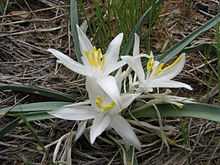Leucocrinum
From Wikipedia, the free encyclopedia
| Leucocrinum montanum | |
|---|---|
 | |
| Conservation status | |
| Scientific classification | |
| Kingdom: | Plantae |
| Clade: | Angiosperms |
| Clade: | Monocots |
| Order: | Asparagales |
| Family: | Asparagaceae |
| Subfamily: | Agavoideae |
| Genus: | Leucocrinum Nutt. ex A.Gray |
| Species: | L. montanum |
| Binomial name | |
| Leucocrinum montanum Nutt. ex A.Gray | |
Leucocrinum montanum, commonly known as the sand lily, starlily or mountain lily, is the only species in the monotypic genus Leucocrinum, placed in the family Asparagaceae, and subfamily Agavoideae.[1] It is native to the western United States.[2][3][4]
This species is a perennial plant growing from a deep system of fleshy roots. It is stemless, growing no more than about 10 cm (4 in) tall. It produces tufts of long, narrow leaves sheathed together at the bases. The inflorescence is an umbel-shaped cluster of flowers amidst the foliage. The fragrant flower has six white tepals around 2 cm (0.8 in) long. The species is dimorphic in its pollen production, with two distinct pollen forms occurring in separate populations.[4]
References
- ↑ Chase, M. W.; Reveal, J. L. & Fay, M. F. (2009), "A subfamilial classification for the expanded asparagalean families Amaryllidaceae, Asparagaceae and Xanthorrhoeaceae", Botanical Journal of the Linnean Society 161 (2): 132–136, doi:10.1111/j.1095-8339.2009.00999.x
- ↑ Leucocrinum montanum. Germplasm Resources Information Network (GRIN).
- ↑ Leucocrinum montanum. NatureServe. 2012.
- ↑ 4.0 4.1 Leucocrinum montanum. Flora of North America.
External links
This article is issued from Wikipedia. The text is available under the Creative Commons Attribution/Share Alike; additional terms may apply for the media files.
